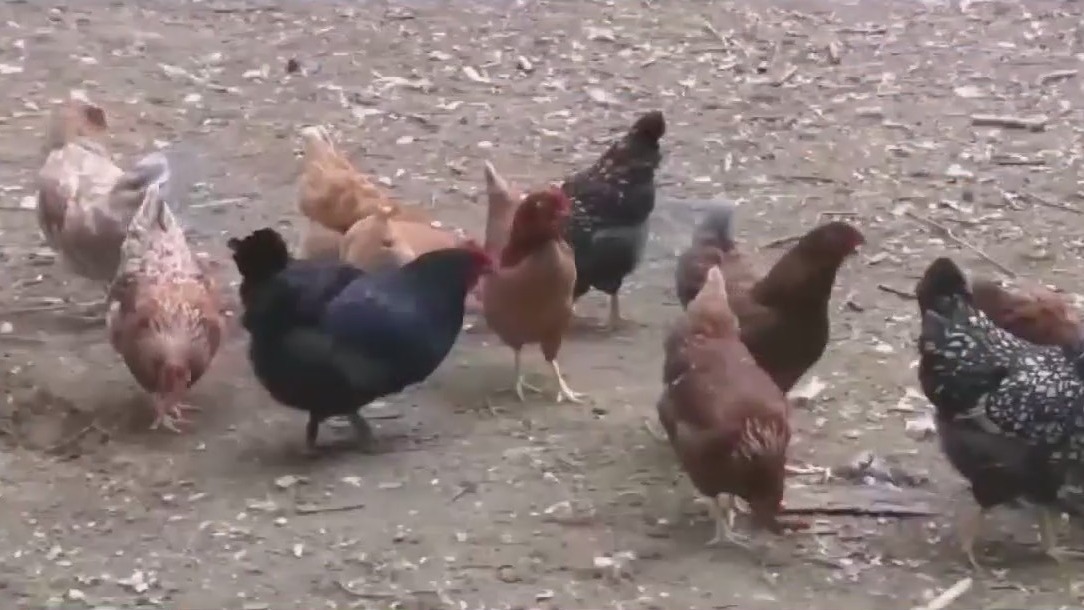Bird Flu in Michigan: One man being tested after exposure to avian flu
Eleven humans at Hess Hathaway Farm had these symptoms after some of the farm’s birds tested positive for avian flu.
-
-
Man from Oakland County farm being tested for Bird Flu.
-
This comes after some chickens on the farm tested positive.
-
100 chickens have been culled, farm is still open.
-
-
Man from Oakland County farm being tested for Bird Flu.
-
This comes after some chickens on the farm tested positive.
-
100 chickens have been culled, farm is still open.
(FOX 2) Waterford, Mich.After being exposed to Bird Flu from sick poultry in Waterford, one guy is undergoing testing.
On Thursday, a backyard flock was found to have contracted highly dangerous avian influenza.Since the virus was initially discovered in Michigan in 2022, this is Oakland County’s second HPAI outbreak.
Oakland County Communicable Disease Unit Chief Christie Clement-Halladay described the symptoms as “mild like upper respiratory symptoms, so congestion and cough.”
Eleven humans at Hess Hathaway Farm had these symptoms after some of the farm’s birds tested positive for avian flu.
“One of our workers went to work to feed the chickens,” Anthony Bartolotta, the supervisor of Waterford Township, stated. “About three of them were dead, and another three weren’t doing well at all. After bagging them, they transported them to Michigan State University for examination.
Unfortunately, the tests on Wednesday came back positive, so the one employee was placed in isolation while health professionals kept an eye on the other agricultural workers.
The farm remains accessible to the public despite the slaughter of about 100 chickens and birds. For four months, the chicken coop will remain under quarantine.
“If it is bird flu, then we do more in depth case investigation with that person to really nail down exactly when their symptoms started; where they were when they had symptoms, who else they were around, so then we would advise them on isolation which is what we do for all respiratory illnesses right now,” Clement-Halladay said.
What is Bird Flu?
We know:
It can be transferred from one flock to another by wild birds, contact with sick animals, equipment, and caregivers’ clothing and footwear.
The U.S. Centers for Disease Control and Prevention (CDC) state that there is still little risk to the public’s health from avian influenza.
Personal protective equipment and biosecurity measures can assist safeguard the public’s and domestic animals’ health in Michigan, according to the state’s Department of Agriculture.
There will be no HPAI-infected birds or bird products in the commercial food chain. As a reminder, all eggs and poultry should be handled and cooked correctly.
Following a few essential procedures is essential to preserving the health and vigor of domestic birds in Michigan, regardless of the size of the flock—whether it’s a small backyard flock or a huge commercial flock:
In order to prevent domestic and wild birds from coming into touch, the state is recommending households to either bring their birds inside or make sure their outside space is completely fenced.
-
Wash your hands before and after handling birds as well as when moving between different coops.
-
Disinfect boots and other gear when moving between coops.
-
Do not share equipment or other supplies between coops or other farms.
-
Clean and disinfect equipment and other supplies between uses. If it cannot be disinfected, discard it.
-
Use well or municipal water as drinking water for birds.
-
Keep poultry feed secure to ensure there is no contact between the feed/feed ingredients and wild birds or rodents.
Owners and caregivers of domestic birds should keep an eye out for any abrupt mortality in the flock, a decline in egg production, a sharp drop in water intake, diarrhea, coughing or sneezing, or an increase in sick birds.
Next steps:
The most typical sign of bird flu is itchy, red eyes, which can be transmitted to humans and other animals through bird droppings. Officials claim that the exposed individual does not exhibit these symptoms.
Other signs and symptoms may include:
-
Sore Throat
-
Nausea
-
Respiratory Infection
Monitoring is the first priority, according to medical professionals like Lea Monday, the infectious disease specialist at the DMC.
“Is there a possibility that perhaps H5N1 could have a mutation that would make it easier to spread from person to person and if that happens, what that means you don t need exposure to a chicken or a cow because you could ve gotten it from somebody at the grocery store,” said on Monday.
She believes it’s crucial to let your doctor know if you have barnyard animals at home and you have flu-like symptoms so they can order additional tests.
The Source: Waterford Township Supervisor Anthony Bartolotta, Oakland County Communicable Disease Unit Chief Christie Clement-Halladay, and DMC’s infectious disease specialist Dr. Lea Monday were interviewed by FOX 2 Reporter Scott Wolcheck. CDC reports were also cited by FOX 2.











